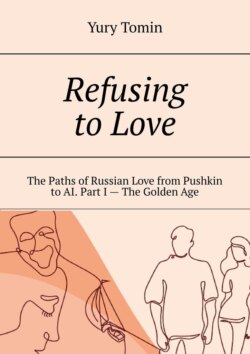Читать книгу Refusing to Love. The Paths of Russian Love from Pushkin to AI. Part I – The Golden Age - Yury Tomin - Страница 3
I
ОглавлениеAn obnoxious discovery. Tempest in the web. An accidental connection. Transparent hints. A voice in the digital wilderness. The past in the present. Vices and prophets. A roll call from across the ocean
Approximately three hundred years ago in the early eighteenth century, love appeared in Russia. In the time of Peter the Great, according to the famous Russian writer Boris Akunin, it was «brought to Russia by foreigners along with allonge wigs, earthen apple and coffee.» He made the discovery in 2012, finding the absence of «old-Russian love vocabulary» in the ancient sources, and boldly breaking the laws of strict logic, published the original conclusions in his blog.
In the web unfolded «not a joke, but almost a scientific discussion.» Someone did not understand the light irony of the writer and in all seriousness advised of the historical events in Russia, colored with passion. Some stood up for love, proving its inseparable existence with the human race from biblical times. Well, some took it upon themselves to accuse the writer of liberalism and historical illiteracy, while at the same time mentioning for some reason that «he walks on the boulevards against the authorities.» Significantly, and as we may also presume far from accidentally, the question of Russian love’s autochthonousness emerged from oblivion and was sharpened precisely in the midst of the Boulevard Revolution in Russia, which sparked but soon extinguished. Surprised by the activity of the netizens in defense of the Russian love’s honor, the writer considered it prudent to point straightforward ladies and perpendicular gentlemen to his literary trolling, but nevertheless he did not refrain from hinting that his tale about the Russian love has some truth, having pointed to the well-known history of the appearance, disappearance, revival, flowering and spread of the European love, also mentioning that it is actually about the «sublime love».
One sincere commentator, trying Akunin’s idea of the absence of love in ancient Russia on the contemporary reality, reported that it does not exist even now. This skeptical contribution to the spontaneous discussion was apparently made, if not implied by something purely personal, by a rather observant person who also had in mind not just the impulses of sex, but precisely true love, which can only be of one «freshness» – high. Sometimes even an indirect shift to personalities can bring a sensitive fresh breeze and turn a mass exchange of opinions in a radically different direction. But the point that sharpened the discussion was ignored: the network’s patriotic activists were frothing at the mouth to defend their romantic past, not caring in the slightest about the state of tender feelings in the observable fatherland.
And in vain. Ten years later, Russian society, lulled by the sweet-talking leaders with ideas about their own greatness, will have gone beyond the boundaries of humanity and plunged into a time of troubles, when even the most flexible minds will only be perplexed and try in vain to find the missing links in their once graceful explanatory concepts. Back then, no one ever thought that a society that omits love from its life and replaces it with surrogates in all niches – from pop bohemia, New Russians with their glamorous girlfriends, the masses hooked on beer and jerk humor, to the ambiguous marital status and sexual orientation of the top officials of the state – is doomed to a slide into its most sad and pernicious vices. And first of all, those who, due to the duty of their professional role, were charged with propagating the divine revelation that only love can truly resist sins, diligently closed their eyes and loyally erred.
In the same year, when the lines of true love and the dignity of the inhabitants of a vast country crossed in the creative life of one Russian writer, Marilyn Yalom’s book was published in another outstanding country in many respects with the echoing title: «How the French Invented Love: Nine Hundred Years of Passion and Romance.» The book told Americans that there is a kind of sublime love that in human history originated almost a thousand years ago in France, took a winding path, became an integral spiritual part of the French and still makes itself felt in one way or another, for example, in a baisemain, a kiss of the hand when meeting a woman.
Boris Akunin (Grigori Chkhartishvili)
